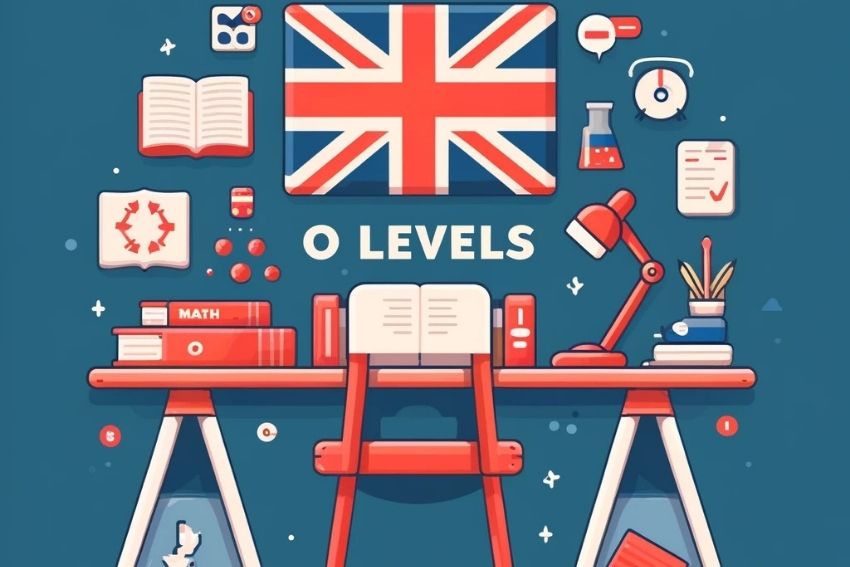O Levels UK: The Ultimate Guide to Academic Excellence
O Levels, or Ordinary Levels, are a globally recognised academic qualification. They play an important role in education. These exams provide a solid foundation in key subjects. Helping students develop essential skills and knowledge for their future. They have high standards and earn respect from schools, colleges, and employers worldwide.
In the UK, O Levels has evolved over time. Historically, they served as a crucial step towards advanced qualifications like A Levels. Although replaced by GCSEs in the UK, they remain important in many countries, offering a structured and comprehensive curriculum that equips students for higher education or entry into the workforce.
This blog aims to provide a comprehensive guide to O Levels, helping students, parents and others understand their structure, significance, and the opportunities they offer.

What Are O Levels and How Do They Fit into UK Education?
Ordinary Levels (O Levels) are an internationally recognised academic qualification. They originated in the United Kingdom and were first introduced in the 1950s as a standardised assessment for secondary school students. For decades, they formed a key part of the UK education system. Although replaced by GCSEs in the UK, they remain a respected qualification in many countries.
Currently, these qualifications are offered by leading exam boards like Cambridge Assessment International Education and Pearson Edexcel, ensuring their global credibility. They cover a wide range of subjects, providing students with a solid academic foundation and preparing them for advanced studies or professional opportunities.
The purpose of these exams is to assess students’ understanding of key subjects, helping to develop critical thinking, problem-solving, and analytical skills. They play an essential role in shaping a student’s academic journey, whether preparing for A Levels, further education, or entering the workforce.
Why Does it Matter? The Importance of This Qualification
O Levels represent a major milestone in secondary education. They provide the essential skills and knowledge that prepare students for more advanced qualifications like A Levels or equivalent programmes. The curriculum ensures learners gain a deep understanding of key academic subjects, building confidence for higher education.
One of the greatest advantages of O Levels is their international recognition. Schools and universities around the world view them as a benchmark of academic achievement. Many higher education institutions, especially those in countries following the British system, accept O Level results as part of their admissions process.
By mastering core subjects like Mathematics, Science and English, students are well-prepared for A Levels or other qualifications, paving the way for university or career success.
How O Levels Are Structured: Core and Elective Subjects
The structure of O Levels is designed to give students a well-rounded education. It helps them build a strong academic foundation while exploring their interests. They include both core subjects and elective subjects. Core subjects, like Mathematics, English, and Sciences, are required for most students. These subjects provide the essential knowledge needed for further studies and future careers.
Students can also choose from a wide range of electives based on their interests and career goals. Popular subjects include: Geography, History, Economics, Business Studies, and languages like French or Mandarin. This flexibility allows students to tailor their studies while meeting the academic requirements for higher education.
When choosing O Level subjects, it’s important to think about future goals. For example, students interested in engineering or medicine may focus on Physics, Chemistry, and Biology, while those interested in humanities or social sciences may choose subjects like Literature or History. By selecting subjects that match their interests, students can set themselves up for success in A Levels and university admissions.

How O Levels Are Assessed: Exam Structure and Grading Explained
O Levels use a structured assessment system that measures understanding, application and analysis. Exams are primarily written and divided into multiple papers per subject. They include various question types, such as multiple-choice, structured and essay-style questions, testing both theoretical and practical skills.
O Level grades are awarded on a scale from A to E*, with A* representing outstanding achievement and E as the minimum pass mark. Grades below E are considered fails. This grading structure ensures consistent academic standards worldwide and helps universities and employers assess a student’s performance objectively.
The Key Differences Between O Levels and Other Academic Qualifications
O Levels are often compared to GCSEs, the IB Middle Years Programme (MYP), and A Levels, each with its own approach to secondary education. Ordinary levels and GCSEs are similar in structure, covering core and elective subjects. However, ordinary Levels are more focused and academically demanding. They are graded on a scale from A* to E, while GCSEs use a 9-1 grading system.
The IB Middle Years Programme (MYP) takes a broader approach, focusing on global topics and project-based learning. Unlike Ordinary Levels, which focus on specific subjects and exams, the MYP encourages creativity and critical thinking across many subjects.
Students take A Levels after O Levels, allowing them to focus on fewer subjects in greater depth. A Levels are harder than Ordinary Levels and are required for university entry. Like these qualifications, A Levels are graded from A* to E, but they require more specialised knowledge in the chosen subjects.
Around the world, schools widely respect these qualifications, especially in countries that follow the British education system. While GCSEs are more common in the UK, many countries in South Asia, Southeast Asia, and the Middle East highly regard O Levels.
Choosing between Ordinary Levels, GCSEs, A Levels, and the MYP depends on your future goals. O Levels give you a strong academic foundation, while A Levels provide more specialised knowledge for university. The MYP and GCSEs offer different paths that may suit various learning styles.
Comparison of O Levels, GCSEs, A-Levels and the IB Diploma
| Feature | O Levels | GCSEs | A Levels | IB Diploma |
| Structure | Subject-specific exams | Mix of exams and coursework | Specialised exams in fewer subjects | Broad-based, interdisciplinary |
| Grading System | A* to E | 9 to 1 | A* to E | Points-based (45 max) |
| Focus | In-depth subject knowledge | Well-rounded education | Deeper focus on fewer subjects | Critical thinking and global awareness |
| International Recognition | Strong (particularly in Asia, Africa, and the Middle East) | UK-focused but widely recognised | Widely recognised worldwide | Highly recognised worldwide |
| Future Pathways | A Levels, Vocational Courses | A Levels, Apprenticeships | University, Career Options | University, Career Options |
Common Challenges of O Levels and How to Overcome Them
O Levels offer a strong academic foundation, but the workload and detailed syllabus can be demanding. Stay organised: build a realistic timetable, break revision into small chunks, prioritise tougher topics and revisit stronger ones to keep them fresh. Use active techniques, practise past papers to learn the format and spot gaps and apply active recall and spaced repetition. For Sciences, focus on core experiments and understand how examiners award marks. Don’t hesitate to ask for help from teachers, classmates, or trusted online resources. With a clear plan and consistent practice, you can manage the challenge and grow in confidence.

Effective Study Strategies to Prepare for O Levels
To excel in O Levels, you need a smart and consistent approach to your studies. Here are some practical tips to help you stay organised and increase your chances of success:
Create a Study Schedule
A well-structured study schedule is essential for staying on track. Break your revision into manageable chunks, allocating specific times for each subject. Be sure to include regular breaks to avoid burnout. Having a plan helps you stay organised and ensures you give enough attention to each subject, especially those you find more challenging.
Use Past Papers for Practice
Past papers are one of the best resources for O Level revision. They show you the exam format, the types of questions, and the level of detail needed in your answers. Practising them regularly will improve your exam technique and help you identify areas where you need more focus.
Join Study Groups or Online Forums
Joining a study group or participating in online forums can be very helpful. Discussing difficult topics with others can improve your understanding, and you can share study tips and resources. Online forums also provide support and motivation from other students going through the same experience.
By following these study tips, you’ll be on the right path to excelling in your O Levels. With a solid plan, regular practice, and support, you can build confidence and achieve your best results.
Useful Resources: Books, Websites, and More
Having the right resources can make a big difference in your studies. Here’s a list of useful tools to help you stay organised, focused, and on track:
Official Websites
- Cambridge International: The official website offers past papers, syllabi, and other helpful resources for students.
- Edexcel: Another leading exam board. It provides past papers, study materials, and other essential resources.
Recommended O Level Books and Guides
- CGP Revision Guides: known for their clear, concise explanations and are great for exam revision. Available for a wide range of subjects.
- Collins GCSE Revision Guides: offers summaries, practice questions, and tips specifically tailored for O Level students
Online Platforms for Practice Exams and Notes
- Revision World: This platform offers free O Level past papers, revision notes, and resources for various subjects.
- Save My Exams: Known for its comprehensive study materials, this site provides revision notes, past papers, and exam tips.
YouTube Channels and Apps for Exam Revision
- ExamSolutions: This YouTube channel offers video tutorials and exam solutions, especially for Maths and Sciences.
- Quizlet: An app that helps you create flashcards for key terms and practice recall for your subjects.
Using these resources alongside your study techniques will ensure you have everything you need to succeed.

What Comes After? Future Education and Career Options
Once you’ve completed your Exams, you have many exciting paths ahead to further your education and career. One of the most common options is to move on to A Levels. This allows you to specialise in subjects you’re passionate about, like Science, Maths, or Humanities. A Levels offer a deeper understanding of these subjects and are often required for university entry.
Alternatively, you could choose the International Baccalaureate (IB) Diploma. This provides a well-rounded education, combining a variety of subjects with an emphasis on critical thinking and global awareness. The IB has a worldwide recognition and opens doors to universities across the globe.
If you’re looking for a more practical approach, vocational courses are a great option. These courses focus on providing specific skills for careers in fields like business, healthcare, engineering, and IT. They offer a hands-on learning experience, which is ideal if you’re aiming to start work straight after or pursue a specialised career.
O Levels play an important role in helping you gain admission to colleges and universities. They provide a solid foundation in academic skills and knowledge. Whether you plan to continue with further education or jump into the workforce, O Levels equip you with the skills and qualifications to succeed in many different fields.
Conclusion
As we’ve discussed, O Levels provide a valuable and recognised qualification that prepares students for future academic and professional success. By providing a strong foundation in core subjects, Ordinary Levels help students develop critical skills that are essential for further education and career opportunities. Whether you’re considering A Levels, vocational courses, or other paths, they lay the groundwork for your future growth.
As you explore your subject choices, be sure to use the resources and tips shared in this blog to make informed decisions about your studies.
If you’re looking for extra support to ensure you achieve top results, Online Tutors can offer personalised guidance and expertise to help you succeed. With the right preparation and dedication, you’ll be ready to take full advantage of the opportunities and confidently move forward in your academic journey.
Use the information from this guide to plan your studies, or reach out to an online tutor for extra help. With the right support, you can achieve your best results and set yourself up for a bright future!
FAQs
What are O Levels?
These are a set of academic qualifications that were historically part of the UK education system. They were designed to assess students’ understanding of key subjects, typically taken at the end of secondary school. Although they have been largely replaced by GCSEs in the UK, O Levels are still offered in some countries and recognised internationally. The exams focus on subjects such as Mathematics, Science, English and Humanities.
What is the grade for O Level?
The O Level grading system typically ranges from A to E, with A being the highest grade and E representing a passing grade. Any grade below E counts as a fail. In some cases, the grading may include A*, which indicates outstanding performance. The grades awarded reflect a student’s understanding and application of the subject material.
How many subjects are required for O Levels?
The number of subjects you take for these qualifications can vary depending on your interests and the exam board, but typically, students choose between 5 to 8 subjects. These usually include core subjects like Mathematics, English, and Science, with the option to select from a range of electives such as History, Geography, or Foreign Languages.
Are O Levels harder than GCSEs?
They are often considered more academically rigorous compared to GCSEs, particularly in terms of subject depth. While both qualifications assess knowledge in similar subjects, Ordinary Levels tend to focus more on in-depth theoretical knowledge and require a higher level of critical thinking and application.
Can O Levels be taken privately?
Yes, students can take these qualifications privately. Private candidates can register with exam centres, sit for exams, and receive grades just like regular students. However, private candidates should ensure they have access to the right resources and support to prepare for the exams effectively.








